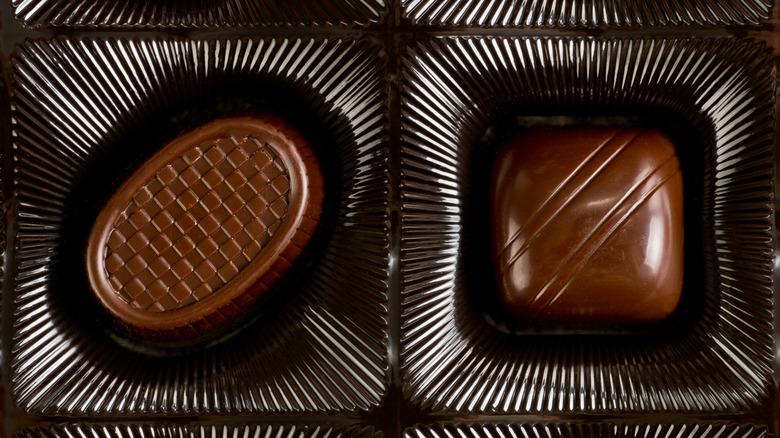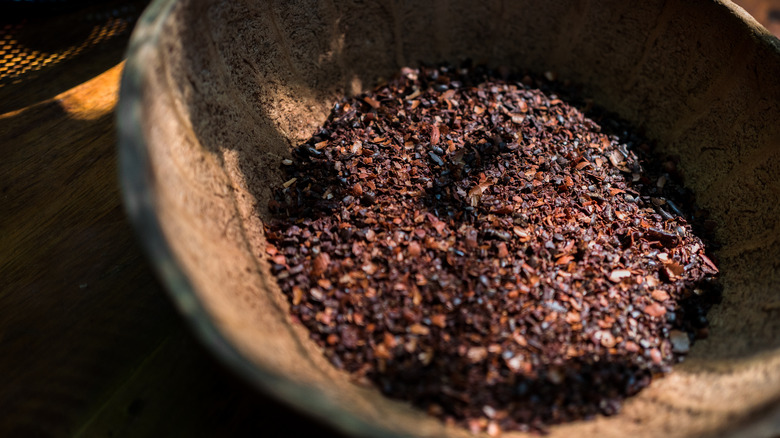This Country Consumes The Most Chocolate
When it comes down to it, chocolate is on the mind of most of us in the Western world. Those in the Americas and Europe are obsessed with chocolate and bake it into cakes and brownies, drizzle it atop our ice cream, and even go so far as to melt it into our coffee. Whether you like it milky, semi-sweet, bittersweet, or dark — chocolate is a decadent treat for the tastebuds.
Companies make it and sell it for Halloween candy, advent calendars, valentines day gifts, easter eggs, and do you know what? Chocolate has cornered the market on every Westernized holiday you could imagine, it's just that good.
The BBC reports that while yes, the taste of chocolate is enough to make almost anyone go bananas over it, there is actually more to the story. Though chocolate has traces of "happy" chemicals like caffeine and anandamide which accumulate to signal "love" in our brains, the BBC suspects that our chocolate obsession has more to do with the hearty blend of sugar and fat found in our chocolate bars which, when combined produce a texture that stimulates the feeling of pleasure. So, who are the world's biggest pleasure seekers?
It's sweet in the Swiss Alps
It may not come as a surprise to you that the country that has a whole museum dedicated to Lindt Chocolate and is world famous for its luxury chocolate brands is the number one consumer of this sweet (via Lindt Home of Chocolate). Switzerland is the home of many chocoholics, with an annual per capita consumption of 11.6 kilograms (25.6 lbs.) reported by Statista in 2021.
Switzerland, a country full of picturesque ski slopes, unbelievably clear lakes, and green valleys, is also rich with leading chocolate producers Toblerone (founded in 1908) and Lindt (founded in 1845). It's no wonder that with so much wonderful chocolate at the tips of their fingers, the Swiss people are so indulgent. Their neighbors in Germany are almost equally obsessed with Switzerland's products and are the second largest chocolate consumers worldwide, importing swiss chocolate by the bucket load (via World Atlas).
The history of Chocolate in Switzerland
Chocolate production, the kind that involves butter and sugar and all the things that make chocolates what we love today, truly came to fruition in Switzerland and remains a large part of the modern Swiss economy. The House of Switzerland reports that the annual revenue of chocolate production in Switzerland is on average $1.5 billion and that the Swiss produce 180,000 tons of chocolate per year, 39% of which is sold in Switzerland.
All of this production began in the 19th century when François-Louis Cailler opened the world's first mechanized chocolate factory in Vevey, Switzerland in 1819 (via SwissInfo). This innovation allowed Cailler to mass-produce chocolate and make it more affordable. Alpine Wild notes how the Swiss chocolate industry continued to evolve with Rodolphe Lindt chocolate technique called 'conching' founded in 1879 which helps to create a creamy, smooth, and flavorful product. Today, the Lindt company is still popular among chocolate lovers, and Swiss chocolate is notorious for its quality brands.
Chocolate and your health
By now, you're probably all too aware of the health concerns of eating too much chocolate. Medical News Today links chocolate consumption with weight gain, tooth decay, migraine risk, and low bone density.
However, it would be unjust to note all the negatives of eating chocolate without pointing out the positives. The National Library of Medicine claims that daily consumption of dark chocolate may support cardiovascular health by lowering cholesterol and improving blood pressure. Dark chocolate especially is full of flavanols which have anti-inflammatory effects on the body, and, in addition, the American Academy of Neurology conducted a study where those who were neurovascularly impaired saw a notable increase in neurovascular coupling after thirty days of cocoa consumption.
Dark chocolate contains more nutritional benefits than milk chocolate because it contains more flavanol-rich cocoa solids as compared to milk chocolate so if you are planning to eat chocolate to improve your health, look for chocolate with a higher percentage of cocoa (via Cleveland Clinic).



